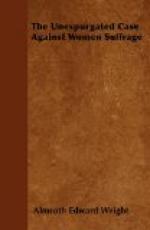There are, however, three questions in connexion with which the law can and does make a distinction between man and woman.
The first is that of sexual relations: rape, divorce, bastardy, and the age of consent. In connexion with rape, it has never been alleged that the law is not sufficiently severe. It is, or has been, under colonial conditions, severe up to the point of ferocity. In the matter of divorce the law of a minority of man-governed States differentiates in favour of man. It does so influenced by tradition, by what are held to be the natural equities, and by the fact that a man is required to support his wife’s progeny. The law of bastardy [illegitimate childbirth] is what it is because of the dangers of blackmail. The law which fixes the age of consent discriminates against man, laying him open to a criminal charge in situations where woman—and it is not certain that she is not a more frequent offender—escapes scot-free.
The second point in which the law differentiates is in the matter of exacting personal service for the State. If it had not been that man is more prone to discriminate in favour of woman than against her, every military State, when exacting personal military service from men, would have demanded from women some such equivalent personal service as would be represented by a similar period of work in an army clothing establishment, or ordnance factory, or army laundry; or would at any rate have levied upon woman a ransom in lieu of such service.
The third point in which the law distinguishes between man and woman is with reference to the suffrage. The object of this book is to show that this is equitable and in the interests of both.
The suffragist further misapprehends when she regards it as an indignity to obey laws which she has not herself framed, or specifically sanctioned. (The whole male electorate, be it remarked, would here lie under the same dignity as woman.)
But in reality, whether it is a question of the rules of a game, or of the reciprocal rights and duties of members of a community, it is, and ought to be, to every reasonable human being not a grievance, but a matter of felicitation, that an expert or a body of experts should have evolved a set of rules under which order and harmony are achieved. Only vanity and folly would counsel amateurs to try to draw up rules or laws for themselves.
Again, the woman suffragist takes it as a matter of course that she would herself be able to construct a system of workable laws. In point of fact, the framing of a really useful law is a question of divining something which will apply to an infinite number of different cases and individuals. It is an intellectual feat on a par with the framing of a great generalisation. And would woman—that being of such short sight, whose mind is always so taken up with whatever instances lie nearest to her—be capable of framing anything that could pass muster as a great generalisation?




